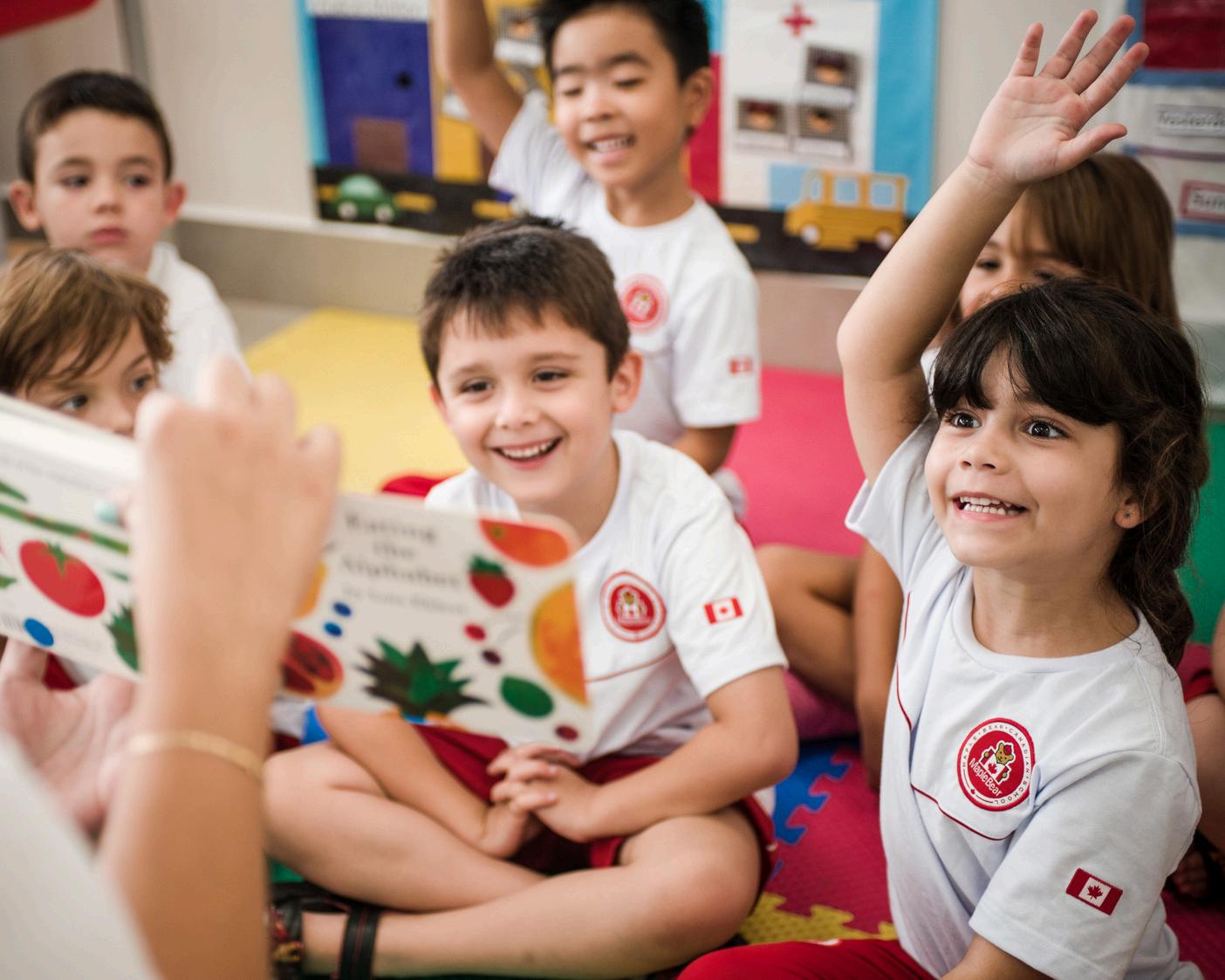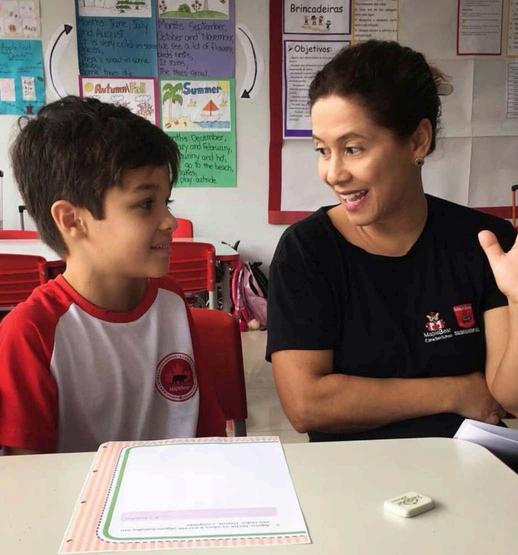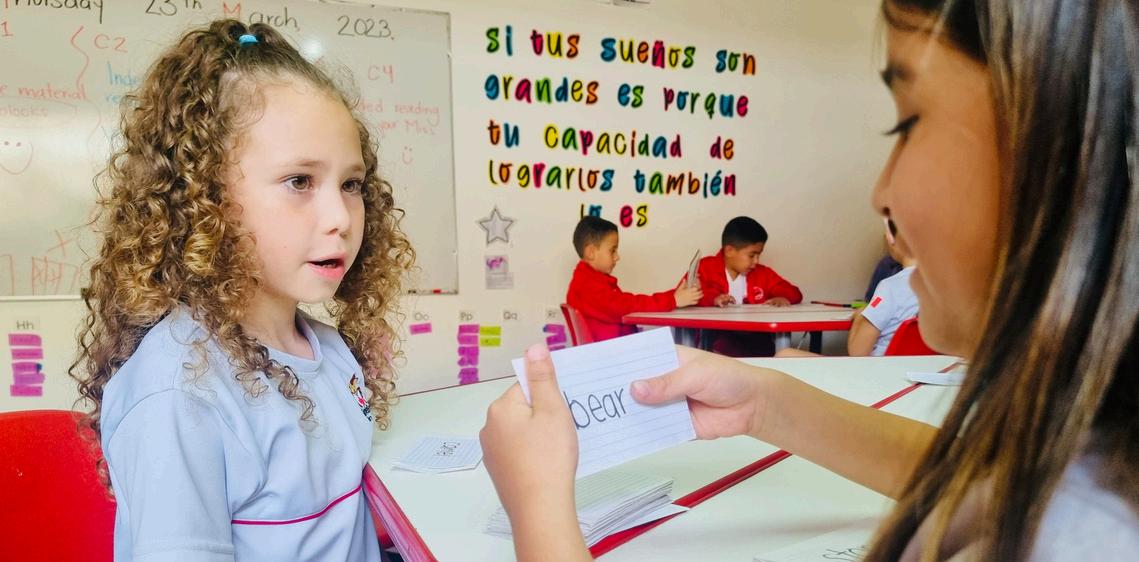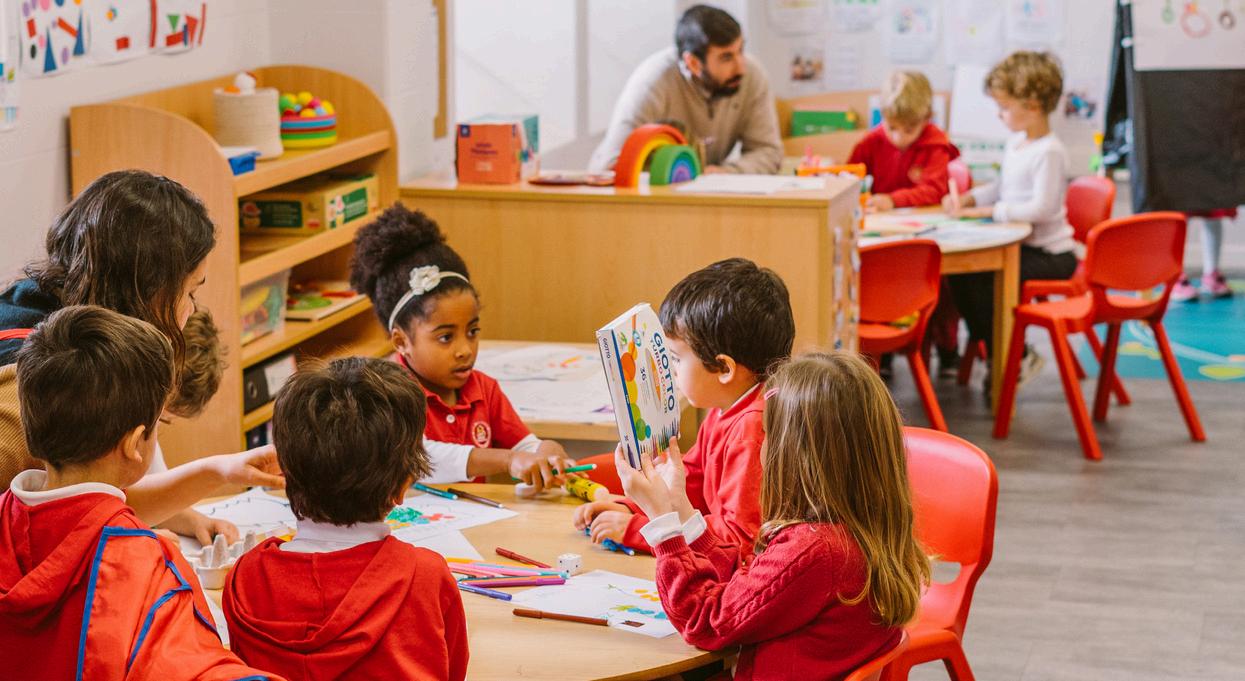





At Maple Bear, we are dedicated to fostering a love of learning and developing a nurturing, engaging environment where every child can thrive.
Our program combines the best of Canadian education with local education regulations, offering a holistic approach that nurtures the whole child through academic excellence, cognitive development, and emotional growth
As a Maple Bear family, you are joining a global community that believes in the value of bilingual education, playbased learning, and a student-centred curriculum to prepare children for success in school and beyond
Through this handout, you’ll discover our unique philosophy, curriculum highlights, professional development and the extensive learning experiences we provide
Together, we’re building a foundation for your child’s future rooted in joy, curiosity, and a commitment to lifelong learning
Embark on a journey of learning and growth with Maple Bear!



The Maple Bear curriculum is developed in Canada by a dedicated team of curriculum experts and educators with extensive experience in the field It is built on well-researched educational practices that are proven to support student success Recognizing the dynamic nature of education, Maple Bear continuously updates its curriculum and resources to reflect the latest advancements in research, pedagogy, and global trends
Canada consistently ranks among the top countries in English, math, and science, as highlighted by the PISA (Programme for International Student Assessment) standardized testing, which evaluates the educational performance of students across participating countries This strong foundation ensures that the Maple Bear curriculum upholds high academic standards, offering parents confidence that their children are receiving a worldclass education focused on academic excellence and real-world readiness

Maple Bear nurtures children’s innate curiosity and love for learning by providing a rich and diverse range of stimulating experiences.
Our approach goes beyond academics, focusing on teaching children essential life skills such as critical thinking, problem-solving, research, communication, and fostering independence We encourage students to become reflective thinkers who can analyze information and make thoughtful decisions
In addition to cognitive growth, our curriculum emphasizes the development of the whole child, supporting social, emotional, and physical well-being This balanced approach ensures that children are equipped to thrive not only in the classroom but in life
With Maple Bear, you can be confident that your child is receiving one of the best educational experiences in the world, designed to shape well- rounded, capable, and compassionate individuals


The Maple Bear Global Schools (MBGS) curriculum is designed to offer students the best of a Canadian education, fostering critical thinking, creativity, and global awareness Rooted in research-based practices, it emphasizes holistic student development through a balance of academic rigour and real-world learning. This approach ensures that students are equipped with the skills and knowledge to thrive in an ever-evolving global landscape
The MBGS curriculum engages students through interactive, hands-on learning experiences that connect classroom concepts to real-world applications By encouraging inquiry, collaboration, and exploration, it fosters a dynamic environment where students are motivated to actively participate and take ownership of their learning

Play and play-based learning activities are integral to Maple Bear curriculum development and implementation because they:
Support the development of critical cognitive, social, and emotional skills in a natural and engaging way
Encourage exploration, experimentation, and problemsolving, fostering creativity and curiosity
Provide a joyful, low-pressure environment where foundational knowledge is built
Promote active learning through hands-on experiences that align with children's developmental stages
Enhance collaboration and communication skills as students interact with peers in a playful setting


Research in neuroscience shows that playbased learning has many benefits for children’s brain development It stimulates different parts of the brain, helping kids become more adaptable and flexible in their thinking.
Play also sparks imagination, builds problem-solving skills, promotes selfreflection, reduces stress, and strengthens emotional resilience, all of which are essential for healthy growth and learning
Play-based learning is a powerful tool in the Maple Bear toolbox that fosters cognitive,social and emotional development
Ourpriorityofthechild-centredprogramatMaple Bearisliteracyskilldevelopment
AtMapleBear,childrenareimmersedinalanguagerichenvironment,allowingthemtoacquireanduse vocabularythatwillallowthemtobecome independentandeffectivelearners Theywillnotonly learntoread-theywilldevelopalifelongloveof reading,anessentialskillfortheirpersonalgrownand fortheirfutureendeavors.
Astrongliteracyprogramisthekeytosuccessin readingandwriting AtMapleBear,thisincludes:
Engagingspeakingactivities
Exposuretorichchildren’sliterature
Encouragingreadingathome,andoffer Smallgroupinstructionforpersonalizedlearning
Thisstrongfoundationinliteracyskillsensuresthatour MBGSstudentsareableto:
Communicatebylisteningandspeaking
Makesenseofwrittentext
Communicatethoughtsandfeelingsusingwriting strategies
Useandrespondtomedia
Effectivelycommunicatewithorallanguage
Developtheirownstoriesandexplanations
Reading is an enabler which opens the door to all learning Each child will, in this way, gain confidence and acquire the skills required to become a lifelong learner
• • • Communication and language development
Listen attentively
Listen to stories and respond

Phonological awareness is a key component of reading skill development, focusing on a child's ability to recognize and work with the sounds in spoken language, as well as the individual sounds within words This foundational skill is essential for reading success, as it helps children understand how letters correspond to sounds, enabling them to decode words
At Maple Bear, we nurture phonological awareness through engaging activities like songs, rhymes, poems, and wordplay, alongside carefully selected books that emphasize sound patterns These activities make learning fun while building crucial early literacy skills
To further enhance students' creativity and critical thinking, we use tools such as graphic organizers These tools allow students to explore and express their ideas freely, without being restricted by rigid structures Graphic organizers also promote critical thinking by helping students organize and make sense of information, as they visually map out their thoughts, analyze concepts, and draw connections between ideas This approach ensures that our students develop both the technical and analytical skills needed for reading comprehension and overall academic success

Maple Bear implements a "gradual release of responsibility" model in its teaching approach Teachers begin by modelling concepts, then guide students as they start to apply their knowledge and skills, ultimately stepping back to allow students to take greater ownership of their learning while still providing feedback and support. This model equips students with the tools they need to understand their world and approach learning with confidence

Assessment at Maple Bear is an ongoing process that plays a crucial role in each child's learning journey To be effective, assessments should focus on students’ strengths and provide insights into their development over time
The assessment tools we use include:
Learning Continuums
Observations
Conversations
Daily records of student learning
Projects
Portfolios
Checklists
Rubrics
Parent-Teacher Conferences


In bilingual immersion education, children can learn two languages concurrently by social interaction and develop their linguistic system through the language spoken by adults and other children Children learn in the same natural way that they learn their first language
Research shows that immersion is the best method of learning an additional language and is ideal for young learners When children learn more than one language, they can improve their skills in the cognition area, enhancing comprehension, creativity and reasoning Immersion programming works because it promotes faster and higher proficiency
Children learn a new language by going through the following stages:
Listening
Listening & comprehension
Listening, comprehension & speaking
Listening, comprehension, speaking & reading
Listening, comprehension, speaking, reading & writing

In an immersion setting children do not hear their first language Parents are concerned that their children will not understand However, teachers facilitate communication through:
Rate of speech
Phrasing and rephrasing
Gestures Facial expression
Dramatic expression
Favourite songs: having fun singing and doing the actions together
Reciting poems, rhymes and jingles together
Games
Teachers encourage students and develop their confidence in learning by not correcting them when first learning the language but by repeating their statements correctly.
THERE IS NO TRANSLATION SO CHILDREN BEGIN TO THINK IN THE SECOND LANGUAGE INSTEAD OF TRANSLATING IT.


Learning centres are essential in the Maple Bear curriculum because they provide students with opportunities to explore various subjects through hands-on, independent activities tailored to their interests and needs. These centres encourage self-directed learning, collaboration, and the development of critical thinking skills in an engaging and supportive environment Students explore centres that encourage imaginative play as well as centres for the development of math, language and inquiry skills
Children will:
Develop sensory learning
Learn cause and effect
Learn to use tools
Develop a sense of size, shape and space, volume and mass
Use math concepts, for example, the concept of time
Develop an understanding of science and technology
Develop reading skills
Develop group social skills such as sharing and collaboration
At Maple Bear, our curriculum programs are designed to actively engage children in meaningful tasks, with teachers who offer genuine encouragement in a positive setting
The classroom environment features:
A structured and consistent routine where activities occur regularly and predictably A language-rich atmosphere where teachers use language that promotes both understanding and speaking skills
Opportunities for discussions with English speakers to model socially appropriate language use

Maple Bear classrooms are vibrant communities that encompass students with diverse interests, skills, learning styles, and cultural backgrounds
Our approach to Differentiated Instruction is proactive and growth-focused, allowing teachers to tailor content, processes, products, and learning environments to meet each student's needs
This creates an atmosphere conducive to fostering respectful, meaningful relationships Maple Bear is committed to ensuring success for all children through an inclusive educational philosophy and program
Students:
Develop literacy in math by engaging in thought provoking activities and talking about mathematical concepts
Apply mathematical knowledge and solve problems in may ways, including the use of concrete manipulatives, pictures and mathematical representations.
Students:
Demonstrate curiosity and a willingness to explore and experiment
Demonstrate an understanding of and care for the natural world (Environmental Literacy)
Use technology and understand the impact of technology on our world
Examples
Shape sorting
Counting songs and rhymes
Pattern recognition
Blocks and puzzles
Cooking and measuring
Storybook math
Examples
Sensory exploration stations (water, sand, playdough)
Gardening and planting
Magnet exploration
Nature walks
Butterfly lifecycle exploration
Light and shadow play
Weather walks

Students:
Identify feeling evoked by art
Move and respond to rhythm and mood of music
Show appreciation of art, folk songs and dances
Use a variety of media to express ideas
Communicate responses to music, art, drama, and dance
Express pride in their work and are encouraged to be creative
Students:
Demonstrate an understanding of the things that make us, as individuals and as cultures, unique
Learn about family customs
Talk about past and present events in their lives and in their families
Observe animals and plants to explore the things they need to survive and changes they undergo over time

Maple Bear aims to empower students to become responsible citizens and future leaders in their respective countries
The concept of 'Giving Back' is integrated into the curriculum at all levels, encouraging students to actively participate in initiatives that enhance and support their communities
Examples
Tissue paper or nature art
Hand and footprint
animal art
Finger painting
Playdough sculpting
Rhythm games
Singing and vocal play
Movement and dance
Instrument Exploration
Music with storytelling
Examples
Cultural dress-up day
All about me and family tree collage
Cooking together
Plant growth and nature observations
Seasons and weather changes
Animal habitats




Maple Bear has over 150 Canadian Faculty members who train teachers and school staff across the globe.
We have the best training program in the world On an ongoing basis, our teachers are provided with training on curriculum and strategies by very experienced, highly qualified educators from Canada
The Maple Bear program ensures that children are physically, emotionally, socially and intellectually safe
Teachers are encouraged to build trusting relationships with children This trust leads children to be intellectual risk-takers, knowing that their ideas and opinions will be valued


At Maple Bear, there is an annual Quality Assurance review of every school These Quality Assurance reviews are conducted by very experienced Canadian administrators They involve a school plan for school improvement
You, the parents, are the child’s first teacher We are partners in this critical role of your child's education Therefore, we will communicate with you frequently through parent-teacher conferences, meetings, open houses, special presentations and celebrations
